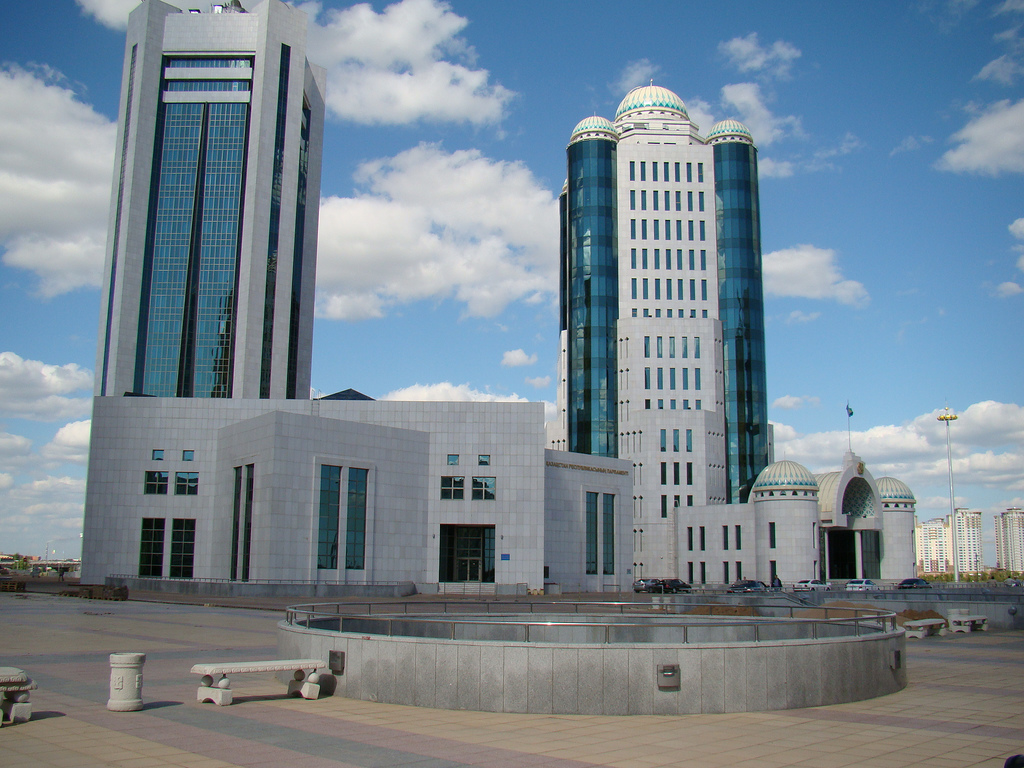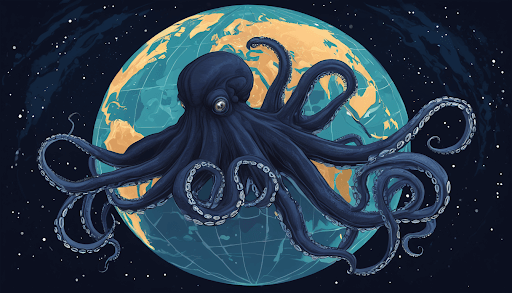Using the Law to Advance Oppression: How Kazakhstan Presents a Veneer of Due Process to Silence Opposition
The Kazakhstan Parliament recently approved a draft law—theoretically designed to protect children and prevent cyberbullying. But, in practice, the law allows the government, already infamous for its persecution of political opponents, to limit criticism of itself.

Published by The Lawfare Institute
in Cooperation With

The Kazakhstan Parliament approved in September 2021 a draft law to restrict the use of foreign social media. The bill is ostensibly designed to protect children and prevent cyberbullying. But the law also offers a tool for the government, already infamous for its persecution of political opponents, to limit criticism of itself.
The draft law says that foreign social networks and messaging services will be obliged to register in Kazakhstan and open local offices in order to receive permission to operate in the country. Companies currently operating in the country will have six months to comply once the law is passed. It will then be the job of their local Kazakh employees to flag content they deem illegal.
This approach could be seen as mirroring the actions of the Russian authorities’ push to strangle civil society and neutralize, in particular, human rights defenders. In Russia, the so-called foreign agents law requires all organizations with “foreign” funding to register with the Russian state. This law has been modified frequently since its inception to become a broad and repressive piece of legislation, making it very difficult to report on any controversial topics involving the Russian government. The law was extended in October to encompass any organizations studying or reporting on the Russian military, space or intelligence agencies.
Freedom of assembly is already heavily restricted in Kazakhstan, with police regularly breaking up unauthorized protests and arbitrarily detaining participants, as they did in February and March 2021. Therefore, opposition political discourse overwhelmingly takes place on social media platforms or via messaging groups, so it is likely that Kazakhstan’s leaders are preparing to follow the path of Russia in expanding their ability to stifle dissent. In fact, as a result of the bill, Facebook now has had to deny that it is helping the Kazakh government to censor online content.
One of the people that the Kazakh government is worried about organizing such protests via social media is former opposition leader Mukhtar Ablyazov. He has been subjected to a worldwide campaign of litigation with Kazakhstan seeking to discredit and humiliate him and his associates by accusing them of a $6 billion fraud. More commonly known as the BTA bank litigation, a worldwide hunt for the alleged stolen billions is still ongoing, but almost no money has ever been found. Across Europe, a number of Ablyazov’s associates have been given political asylum as their liberty has also been threatened.
Kazakhstan’s authorities have a long history of attacking anyone connected to one of their opponents, political or otherwise. The Kazakh regime will use any means necessary to secure their aims while purporting to comply with the rule of law. The recent uprising and suppression of protesters with lethal force and assistance from the Russian military has received widespread international criticism. Additionally, the Kazakh regime has been shown to participate in extraterritorial renditions, as well as using private security firms to spy on individuals. As told by the Financial Times journalist Tom Burgis in his book “Kleptopia,” Kazakhstan has a history of using both the courts and “black PR” to change the narrative and try to create some sympathy with their cause.
Following each incident, individuals are writing articles casting doubt on the events and trying to brand the Kazakh dissidents as criminals—tactics that are difficult to detect unless you know where to look. For example, in the BTA litigation, without proper context, it is very easy to skew the story as being just about fraud. In reality, it is much more terrifying than that and involves an assassination attempt on Ablyazov. The Kazakh regime also kidnapped his wife and child and continue to put pressure on his associates, all while trying to spin the focus on the fraud—not on the egregious breaches of international law.
The Kazakh regime is extremely proficient when it comes to arbitration, which is highly susceptible to the use of political pressure and subversion by the press—awards and proceedings are not always public, and the evidence presented is often difficult to challenge. In a notable case, now known as “Tristangate,” Kazakhstan has refused to pay a fully adjudicated $500 million arbitral award to two Moldovan investors as compensation for the forced nationalization of their companies in 2010.
In the Tristangate case, Stati et. al. v. Kazakhstan, Judge Amy Berman Jackson of the U.S. District Court for the District of Columbia ordered the enforcement of the arbitral award in May 2021. Berman said in a ruling on the Kazakh regime’s failure to disclose information:
Don’t get me wrong, the Republic of Kazakhstan had every right to litigate the petition to confirm the arbitral award, and they had every right to appeal my decision. But those proceedings are over. These are post-judgment proceedings. And the Republic of Kazakhstan and its counsel needs to get that into their heads because the level of intransigence that we’ve seen to date is not acceptable and it officially ends today.
In spite of those warnings, the Kazakh government has decided to go after anyone associated with the case and has launched satellite proceedings against the bondholders, the investment firm Argentem Creek Partners, which continues to have an interest in the payment of the award. In Kazakhstan v. Chapman, Argentem Creek and others, filed in New York, the Kazakh regime alleges that a “murky web” of companies were used to hide investments. They also have challenged the proceedings in a number of European jurisdictions but have lost every case so far. These collateral attacks on the award are combined with the use of experts and negative press to distract from the fact that there seems to be no evidence to support their contentions.
Further, in litigation, Kazakhstan regularly pays for academic opinions that support its narrative and use them to condition the media environment. The interesting issue with arbitration is that, because it is not always possible to see the evidence, it is difficult to tell how much money experts are getting paid over a period of time for different cases. The payment is important because the huge sums paid to experts are essentially contingent on them agreeing with one party. Some academics and politicians therefore make a substantial living from presenting repressive regimes such as Kazakhstan through rose-tinted spectacles. By way of example, in October the press reported that Jonathan Aitkin was paid £166,000 for a flattering biography of former Kazakh President Nursultan Nazarbayev. The same is, of course, true for many lawyers and journalists.
Returning to Tristangate, the Kazakh government is using an opinion written by George Bermann, a professor from Columbia Law School, to support its case. Of course, the opinion is no more than that: It contains no sworn oath, but it is used as if it is the truth. It has even been posted on the Kazakhstan government website and has been used as one of the key pieces of evidence that the government is presenting to try and stop payment of the award. It will almost certainly, however, never be tested in court and the narrative that it creates is difficult to challenge in the media. It is no wonder that if the Kazakh regime can pay people to agree with them, they will do whatever it takes to prevent criticism.
Beyond limiting social media or manipulating the court process to pursue opponents or avoid the rule of law, the Kazakh authorities often use criminal courts directly to further their agenda. One such case is that of my client, Barlyk Mendygaziyev, a U.S.-based Kazakh businessman and avid user of social media, who has been financially supporting the families of political prisoners in Kazakhstan. Not only did the Kazakh government launch prosecutions against him, but it tried to use a bogus Interpol red notice to have him arrested. His family and business assets in Kazakhstan were also directly targeted, and Kazakh prosecutors have charged him with a host of crimes, including “tax evasion,” “financing terrorist activities” and “drug possession.”
Whether claiming to protect children via social media bans or accusing political or business rivals of drug possession, fraud or even terrorism, Kazakhstan’s authorities are interested in only two things: stifling criticism of their actions and avoiding accountability. They use the veneer of law and legal cases to justify their actions when, in fact, they are the ones who should be facing criminal investigation. This pattern of repression and use of sophisticated lawfare has spilled over into their commercial dealings, making conducting business with them almost impossible to those who value the rule of law.





